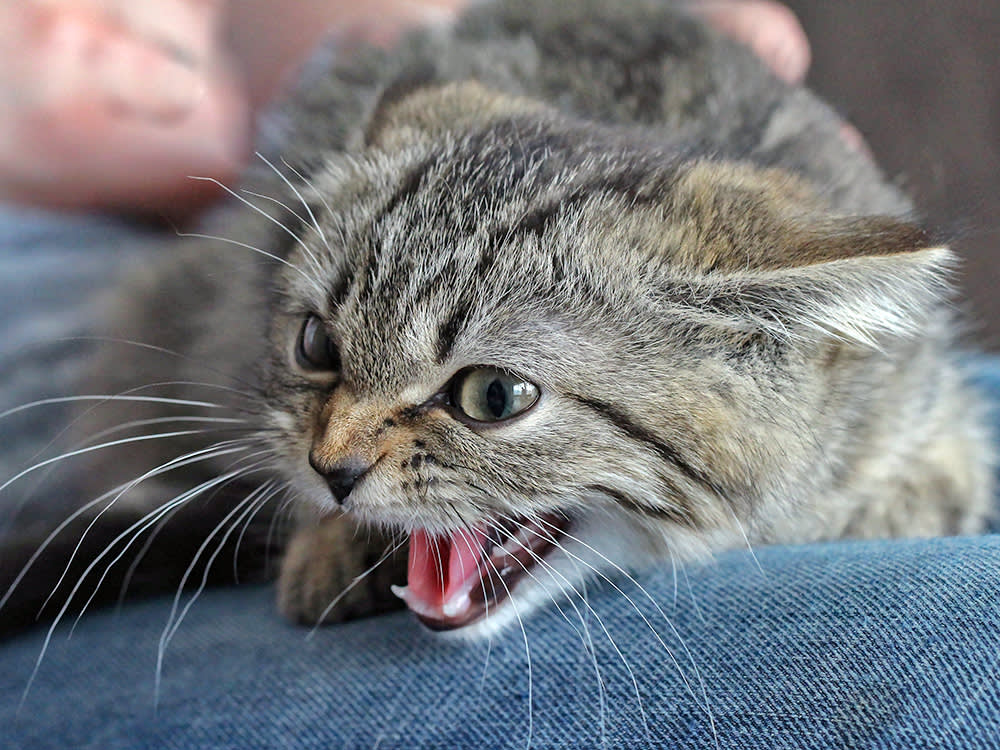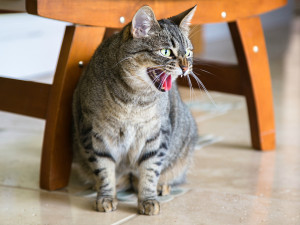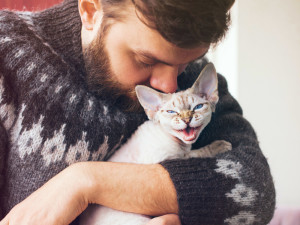
Share Article
In This Article:
Understanding the Basics of Hissing Why Do Cats Hiss? What Does It Mean When a Cat Hisses? What to Do When Your Cat Hisses at You What Should You Do if Your Cat Is Hissing a Lot? Frequently Asked Questions
Cats have mastered the concept of using body language to communicate. Hissing is one of the more obvious and intimidating ways they let us know they’re feeling some intense stuff. But do you know why your cat is hissing or, more importantly, how you should respond so things don’t get worse?
Understanding the basics of hissing
Whether you’re dealing with a kitten, tiger, or any cat in between, a hiss is unmistakable, which is exactly the point. Your cat opens their mouth, shows their teeth, and expresses a burst of air, making that tell-tale hissing sound.

It can be a short, intense hiss or a long, drawn-out hiss. You may see other body language cues, like staring, ears turning or flattening, trying to look larger and puffed up or smaller and compact, cowering, and more.
Hissing can even be involuntary, as defensive instincts kick in and trigger a hiss response.
Why do cats hiss?
A cat hiss is a big neon sign telling you something important. This cat has been pushed past their comfort zone in some way. They need the intensity of that situation to be turned down, so they can feel safe and secure again.
Here are a few scenarios that may cause a cat to hiss.
Why would a cat hiss at you?
Consider the various ways you might be too intense for your cat, like forcing them into their carrier or having a veterinary exam. Maybe a heavy-handed petting session has become uncomfortable. You could have scared them when you saw that spider and screamed. These are just a few reasons your cat may hiss at you.
Why would cats hiss at each other?
Cats will hiss at each other if they’re being pushed past their comfort zone. Those instincts kick in when one cat is fearful of another, afraid that their territory or safety may be at risk, when they want the other cat to back off, play gets too intense, and so on.
Pain can also be a factor. For example, a senior cat with arthritis may hiss at other cats trying to play because they’re worried about a painful pounce.
Why does my cat hiss at a new kitten?
Your cat may hiss at a new kitten for the same reasons they’d hiss at an adult — fear, territory, resource anxiety, intense play, etc.
Hissing may happen more frequently with new kittens as the older cat sets boundaries. Kittens need to learn a lot about interacting with their elders — from understanding how to manage their needle-sharp teeth and claws to learning when the other cat needs a break. A hiss is one way the elder cat can say, “Hey kid, that’s enough. Go away now.”
Why does my cat hiss at a dog?
The same ideas apply here. Your cat may be fearful of your dog, want them to keep their distance, be worried about their resources, and more. It’s all about comfort level. A hiss is one way cats try to gain some control over the situation.
What does it mean when a cat hisses?
You know a bit about the different scenarios that might cause hissing. Now, let’s dive deeper into the “why” of it all.
Anxiety, stress, or fear
Remember, in the wild, cats are predators. But they’re also prey. They have strong survival instincts and are highly reactive to their surroundings. If they’re feeling fear or stress, they may hiss as a way of drawing a line in the sand, trying to put some distance between themselves and whatever has them nervous.
It’s the same reason people will suddenly respond with anger or yelling, even when they’re scared or nervous. It’s a way to make space — to get whatever is stressing you out (even if it’s your own mind) to back off so you can process what you’re feeling. We’re often not even aware we’ve lashed out until it’s over.
A hiss can be exactly like that — an instinctual response when a cat feels overwhelmed and needs everything and everyone to back off so they can regroup.
Petting aggression
We often don’t realize how intense our petting sessions can become, which is why many cats have a strong reaction to being petted. Hissing is a way of setting a boundary and letting you know you need to stop.
You may be missing the more subtle signs they gave first, like leaning away from your hand, swishing their tail intensely, or turning their ears. Now they have to take it up a notch, with a hiss.
Pain
Pain is a huge reason cats will hiss. If the pain is bad, they’re likely feeling extreme stress. Pain can get worse if they move or are picked up. Any of these anxious states can cause a hiss.
Chronic illness
This is similar to pain, stress, and fear. Illness can cause discomfort, anxiety, and worry that pain will flare up. Cats can also just feel rotten, like we do when we’re sick. Hissing can be the result if they’re worried about being bothered, moved, or triggered.
What to do when your cat hisses at you
In most cases, a hiss is pretty high on the list of intimidation tactics. It’s unlikely that you can help a cat relax in this state by interacting with them. Your presence may actually make things worse, put you in danger of an aggressive response, or increase the cat’s danger if they feel they need to get away at any cost.
If any cat is hissing at you, the first thing to do is step away. Turn the intensity down for the cat. Try not to stare directly at them. Avert your eyes, speak softly, and give them some space to decompress.
If the cat is hissing at another animal, the same rule applies. Don’t put yourself between two stressed animals. Look for safer ways to end the interaction between them.
You may come across a cat who’s hissing not at you specifically, but because of the situation. For example, if a cat gets their leg caught in a fence, they may hiss because of the fear and pain of the situation and need help to get out of that situation. But don’t put yourself at risk. We know scared cats can react aggressively toward us, even if we’re trying to help. Take any necessary precautions. Find an expert, if there’s time.
What should you do if your cat is hissing a lot?
While some cats hiss more often or more easily than others, frequent hissing is a sign that something is regularly pushing your cat too far. It’s important to determine what’s causing the issue so you can help your cat relax and feel at ease.
A visit to your veterinarian is the first step. Rule out possible medical issues.
Next, consider working with a certified feline training and behavior consultant. They can help determine what might be triggering your cat and develop a behavior modification plan to reduce stress, build confidence, and manage those intense feelings.
Bottom line
Hissing is an instinctual response to an intense situation.
It’s a cat’s way of trying to create space in that moment and lower the intensity so that they can assess the situation and regroup.
Many things, including stress, fear, and pain, can trigger that intensity.
In most cases, the best thing you can do is give a hissing cat what they’re asking for — a little space.�
FAQs
Is hissing in cats always a sign of aggression or fear?
Hissing in cats isn’t always a sign of fear or aggression. But those are two very common triggers. It can be a mix of stressors, like pain that causes fear, which leads to anxiety. It’s a sign that a cat is being pushed too far in a situation.
How can I calm a cat down when they’re hissing?
The best way to calm a hissing cat is usually by giving them space. They’re feeling overwhelmed. The situation is too intense. Help them by turning your attention away, stepping back, and turning that intensity down any way you can.
Are there specific situations or triggers that commonly lead to a cat hissing?
Cats often hiss when confronted with unfamiliar cats, other animals, or even people who make them feel unsafe. They commonly hiss when they’re feeling pain or are afraid they might feel pain. It’s also a way they set boundaries with other pets and people.
Can prolonged hissing indicate a health issue in cats?
While prolonged hissing isn’t always a sign of a health issue, it certainly can be. That’s why a vet visit is vital if your cat is hissing often, especially when touched or when they’re moving. They may be experiencing physical pain that requires immediate attention.

LeeAnna Buis, CFTBS, FFCP
LeeAnna Buis has adored cats her entire life and thought she knew them inside out and sideways. But it wasn’t until she worked with a feline behavior consultant that she fully understood how incredible, complicated, and inspiring they really are. She made a career change, starting the certification process to become a behavior consultant right away. She discovered what unique, fascinating, complex creatures cats are and knew this was what she wanted to do with her life — help others on a similar journey to truly knowing, loving, and appreciating their cats.
LeeAnna earned her certification through Animal Behavior Institute, where she received the certified feline training and behavior specialist (CFTBS) designation.
Related articles
![Tattooed and pierced woman wearing a black and white striped shirt and holding an upset looking cat]()
Is My Cat Angry at Me? How to Tell if Your Cat is Upset
Cat behaviorist Kristiina Wilson on how to tell if your cat is grumpy—or just kind of like that.
![2 cats on a small chair]()
Welcome to the Jungle: How to Introduce a New Cat to Your Pets
Feels high stakes because it kind of is.
Do You Have a Quiet Kitty? Why Some Cats Don’t Meow
You love that your cat is quiet, but sometimes too quiet can be concerning.
Why Does My Cat Meow at Night? (And How to Prevent It)
Just a small request to lower the volume, please.
![Man playing with his two kittens in bed.]()
Why Does My Kitten Keep Meowing?
What to do, when something that was cute at first becomes perplexing.
The Meaning Behind the Meow: Cat Language Decoded
Understand your cat’s chatter.







